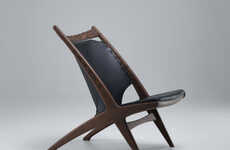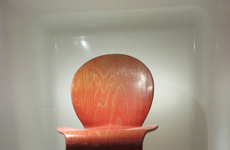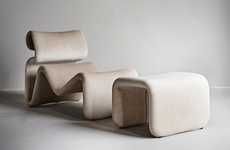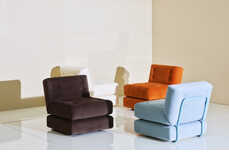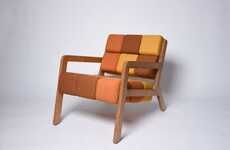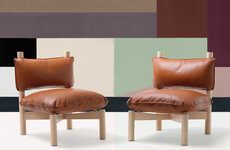
Dan Svarth Reimagines His 1972 Wire Chair for a Danish Furniture Company
Francesca Mercurio — October 12, 2021 — Art & Design
References: designboom
Dan Svarth has designed the latest product for the Copenhagen-based furniture company A. Peterson. Named the 'Wire Chair,' the first of its kind dates back to 1972 when architect Dan Varth was teaching at the Royal Danish Academy. The architect took ordinary water pipes and bent them in such a manner that produced a unique chair.
Today, the architect has reimagined his original design into a studier rendition. The contemporary update consists of using a diagonal carbon fiber weave which makes for a stable seat. The weave has enough give to ensure the chair is equally comfortable as it is stable. The seat is then finished with a hand-polished stainless steel frame welded by artisan Mikkel Kjærholm. The finished product has an industrial and sleek presence and stays true to its original design.
Image Credit: A. Petersen, designboom, designboom
Today, the architect has reimagined his original design into a studier rendition. The contemporary update consists of using a diagonal carbon fiber weave which makes for a stable seat. The weave has enough give to ensure the chair is equally comfortable as it is stable. The seat is then finished with a hand-polished stainless steel frame welded by artisan Mikkel Kjærholm. The finished product has an industrial and sleek presence and stays true to its original design.
Image Credit: A. Petersen, designboom, designboom
Trend Themes
1. Carbon Fiber Weave Furniture - The use of a diagonal carbon fiber weave in furniture design provides an opportunity for the furniture industry to create lighter, more durable and sleek furniture pieces.
2. Reviving Retro Designs - With the resurgence of retro designs, there is an opportunity for vintage designs such as the wire-framed chair to be re-imagined and marketed to a new generation of consumers.
3. Handcrafted Artisan Furniture - Custom hand-crafted furniture can be marketed to luxury consumers who value unique, one-of-a-kind designs.
Industry Implications
1. Furniture Manufacturing - The furniture industry can incorporate carbon-fiber technology into their manufacturing processes to create lighter, stronger and more sustainable furniture designs.
2. Vintage and Retro Furniture - Furniture manufacturers can market re-imagined vintage and retro designs to appeal to a new generation of consumers looking for a combination of nostalgia and modernity.
3. Artisanal Furniture Manufacturing - There is an opportunity for artisanal furniture manufacturers to create custom, handcrafted furniture pieces with unique designs to compete in the luxury furniture market.
3.7
Score
Popularity
Activity
Freshness




